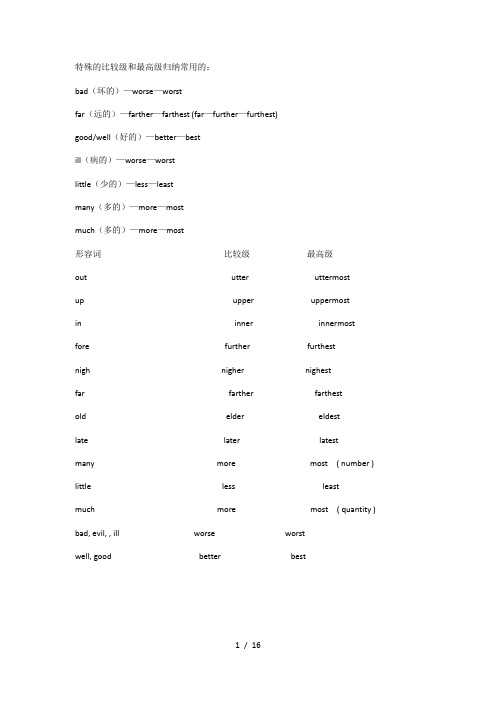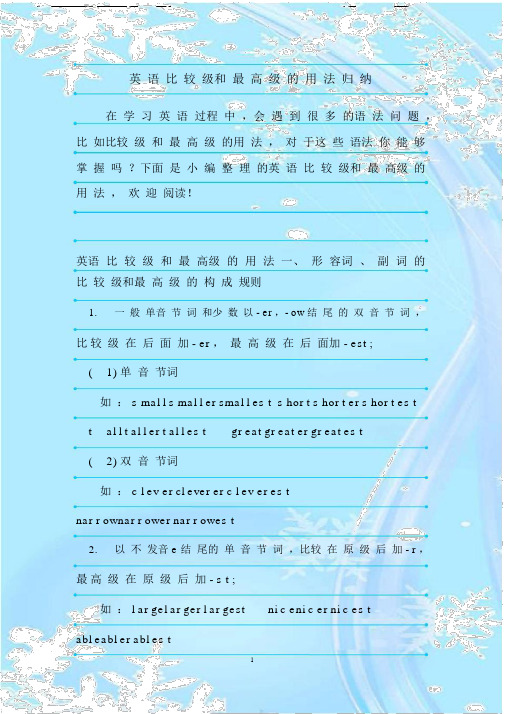完整word版,特殊的比较级和最高级归纳常用的,推荐文档
- 格式:doc
- 大小:23.94 KB
- 文档页数:10

bad(坏的)—worse—worstfar(远的)—farther—farthest (far—further—furthest)good/well(好的)—better—bestill(病的)—worse—worstlittle(少的)—less—leastmany(多的)—more—mostmuch(多的)—more—most形容词比较级最高级out utter uttermostup upper uppermostin inner innermostfore further furthestnigh nigher nighestfar farther farthestold elder eldestlate later latestmany more most ( number ) little less leastmuch more most ( quantity ) bad, evil, , ill worse worstwell, good better best1.般词尾直接加er或est例tall-taller-tallestlong-longer-longest2.发音字母e结尾单词词尾直接加r或st例nice-nicer-nicest3.辅音字母+y结尾词y变i再加er或est例heavy-heavier-heaviest4.重读闭音节末尾辅音字母双写辅音字母再加er或est例big-bigger-biggest5.部双音节词音节词别原级前加more构比较级most构高级例slowly-more slowly-most slowly;beautiful-more beautiful-most beautiful小学英语语法形容词的比较级复习比较级比较级:一、形容词的比较级1、形容词比较级在句子中的运用:两个事物或人的比较用比较级,比较级后面一般带有单词than。
比较级的句子结构通常是:什么+ 动词be (am , is , are ) + 形容词比较级+ than(比)+ 什么,如:I'm taller and heavier than you. (我比你更高和更重。

一、形容词的比较级和最高级变化规则;1、规则变化:(1)单音节词和少数双音节词一般在词尾加 er 或 est:如: small ---smaller --- the smallest(2)以不发音的 e 字母结尾的加 r,或 st:如: late --- later --- the latest(3)以辅音字母加 y 结尾的变 y 为 I 加 er 或 est:如: easy --- easier --- the easiest(4)以一个辅音字母结尾的重读闭音节词双写最后一个辅音字母再加 er 或 est:如 : big --- bigger --- the biggest以 er,ow 结尾的双音节词加 er 或 est如: slow --- slower --- the slowest(5)多音节词前加 more 或 most, 副词最高级前省略 the.如: important --- more important --- the most important2.不规则变化good / well --- better --- the best 好bad / badly / ill --- worse --- the worst 坏many / much --- more --- the most 多little --- less --- the least 少old --- older / elder --- the oldest / the oldest 老 , 旧far --- farther / further --- the farthest / the furthest 远常见形容词比较级、最高级变化一览表1.在形容词词尾加上“er”“est”构成比较级、最高级:bright (明亮的)—brighter—brightest broad(广阔的)—broader—broadest cheap(便宜的)—cheaper—cheapest clean(干净的)—cleaner—cleanestclever(聪明的)—cleverer—cleverest cold(寒冷的)—colder—coldestcool(凉的)—cooler—coolest dark(黑暗的)—darker—darkestdeep(深的)—deeper—deepest fast(迅速的)—faster—fastestfew(少的)—fewer—fewest great(伟大的)—greater—greatesthard(困难的,硬的)—harder—hardest high(高的)—higher—highestkind(善良的)—kinder—kindest light(轻的)—lighter—lightestlong(长的)—longer—longest loud(响亮的)—louder—loudest low(低的)—lower—lowest near(近的)—nearer—nearest new(新的)—newer—newest poor(穷的)—poorer—poorest quick(快的)—quicker—quickest quiet(安静的)—quieter—quietest rich(富裕的)—richer—richest short(短的)—shorter—shortest slow(慢的)—slower —slowest small(小的)—smaller—smallestsmart(聪明的)—smarter—smartest soft(柔软的)—softer—softeststrong(强壮的)—stronger—strongest sweet(甜的)—sweeter—sweetesttall(高的)-taller-tallest thick(厚的)—thicker—thickest warm(温暖的)—warmer—warmest weak(弱的)—weaker—weakest young(年轻的)—younger—youngest2.双写最后一个字母,再加上“er”“est”构成比较级、最高级:big(大的)—bigger—biggest fat(胖的)—fatter—fattest hot(热的)—hotter—hottest red(红的)—redder—reddestsad(伤心的)—sadder—saddest thin(瘦的)—thinner—thinnestwet(湿的)—wetter—wettest mad(疯的)—madder—maddest3.以不发音的字母e 结尾的形容词,加上“r”“st”构成比较级、最高级:able(能干的)—abler—ablest brave(勇敢的)—braver—bravest close(接近的)—closer—closest fine(好的,完美的)—finer—finest large(巨大的)—larger—largest late(迟的)—later—latest nice(好的)—nicer—nicest ripe(成熟的)—riper—ripest rude (粗鲁的)—ruder—rudest safe(安全的)—safer—safest strange(奇怪的)—stranger—strangest wide(宽广的)—wider—widest wise(睿智的,聪明的)—wiser—wisest white(白的)—whiter—whitest4.以字母y 结尾的形容词,把y 改为i,再加上“er”“est”构成比较级、最高级:busy(忙碌的)—busier—busiest dirty(脏的)—dirtier—dirtiest dry (干燥的)—drier—driest early(早的)—earlier—earliest easy(容易的)—easier—easiest friendly(友好的)—friendlier—friendliest funny(好玩的)—funnier—funniest happy(开心的)—happier—happiest healthy(健康的)—healthier—healthiest heavy(重的)—heavier—heaviesthungry(饿的)—hungrier—hungriest lazy(懒惰的)—lazier—laziest lucky(幸运的)—luckier—luckiest naughty(调皮的)—naughtier—naughtiest noisy(嘈杂的)—noisier—noisiest pretty(美丽的)—prettier—prettiest silly(傻的)—sillier—silliest spicy(辣的)—spicier—spiciest thirsty (渴的)—thirstier—thirstiest ugly(丑的)—uglier—ugliest4.双音节、多音节形容词,在单词前面加上“more”“most”构成比较级、最高级:afraid(害怕的)—more afraid—most afraid beautiful(美丽的)—more beautiful—most beautiful careful(仔细的)—more careful—most careful cheerful(开心的)—more cheerful—most cheerful crowded(拥挤的)—morecrowded—most crowded dangerous(危险的)—moredangerous—most dangerous delicious(美味的)—moredelicious—most delicious difficult(困难的)—more difficult—most difficult exciting(令人兴奋的)—more exciting—most exciting expensive(昂贵的)—more expensive—mostexpensive famous(著名的)—more famous—most famousfrightened(受惊的)—more frightened—most frightenedfrightening(令人害怕的)—more frightening—most frighteninghard-working(勤奋的)—more hard-working—most hard-workinghelpful(有帮助的)—more helpful—most helpful honest(诚实的)—more honest—most honest important(重要的)—more important—most important interesting(有趣的)—more interesting—most interesting polite(有礼貌的)—more polite—most polite terrible(可怕的)—moreterrible—most terrible tired(累的)—more tired—most tired5.不规则变化的形容词:bad(坏的)—worse—worst good(好的)—better—bestfar(远的)—farther—farthest (far—further—furthest) ill(病的)—worse—worst little(少的)—less—leastmany(多的)—more—most much(多的)—more—mostold(年老的)—older—oldest ( old—elder—eldest) well(好的,身体好的)—better—best一. 写出下列形容词或副词的比较级和最高级.badcleanfamousdirtybigsmallheavylittlehardhappyfarexpensivewelleasywideyoungrudecheapuglybusyoldnoisyinterestinghotcold many brightboring difficultbeautifulthingoodstronghighwarmlateweaktallshortloudlazyquickangrycleversmartlow二、选择填空1.Which does Jimmy like , Chinese or Art?A.wellB. bestC. betterD. much2.The Changjiang River is one of in the world.A. the longest riverB. longest riversC. the longest riversD. longer rivers3.of the two women is Mrs Brown.A.The beautifulB. The more beautifulC. More beautifulD. The most beautiful4.My mooncake is nicer his.A.likeB. withC. forD. than5.You are fatter than .A.heB. hisC. himD. he is tall6.He jumps of the three.A.farB. furtherC. farthestD. furthest7.My hair is longer than .A.my sisterB. KateC. my brother’sD. Lucys’8.There are paper here .Please bring some.A.littleB. lessC. fewerD. a little9.The pen is than that one.A.more cheapB. cheapC. much cheaperD. quite cheaper10.Tom speaks Chinese better than Jimmy.A. moreB. veryC. a lot ofD. much11.There are girls in Class Two than in Class Four.A. moreB. nicestC. mostD. best12.It’s too for you to do that.A. easyB. more dangerousC. harderD. the easiest13.Who has apples now, Jim, Lily or Lucy?A. muchB. biggestC. betterD. the most14.You have more rulers than me. But are nicer than .A.mine, yoursB. mine, yourC. my, yoursD. my, your15.Tingting is than Meimei, but Meimei is than Tingting.A.all, strongerB. taller, strongestC. tallest, strongD. taller, stronger16.Mother is in my family.A. busyB. busierC. the busiestD. more busy17.There are in the park on Sunday.A. more childrenB. a lot of peopleC. much men and womenD. many peoples18.-This blue sweater is too big for me .-Will you please show me a one?A. smallB. smallerC. the smallestD. smallest19.No one is Mary in the class.A. so tallest asB. as taller asC. so high asD. so tall as20. This bike is than that one.A. twenty yuan dearB. twenty yuan dearerC. dear twenty yuanD. dearer twenty yuan[参考答案]CCDDA CDBCD AADAD CBBDB三、用所给词的适当形式填空1.Y our classroom is (wide) and (bright) than ours.2.T here are (few) hours of sunlight a day in winter than in summer.3.Which do you like (well) , maths or chemistry?4.This is the (good) film I have ever seen.5.Africa is the second (large) continent.6.What he said made his mother much (angry) .7.I’m not as (careful) as he.8.We’ve got as (many) books as we need.9.Pratice as (much) as you can.10.They have done (much) work with (little) money.11.You’re the (kind) person I’ve ever met.12.He is (young) than his two sisters.13.The (old) I get, the (strong) I seem to feel.14.The weather is getting (warm) and (warm) .15.Summer is (hot) season of the year.[参考答案] 1. wider, brighter 2. fewer 3. better 4. best 5. largest 6. angry 7. careful 8. many 9. much 10. more, less 11. kindest 12. younger 13. older, stronger, 14. warmer, warmer 15. the hottest。

英语比较级和最高级的用法归纳在学习英语过程中,会遇到很多的语法问题,比如比较级和最高级的用法,对于这些语法你能够掌握吗?下面是小编整理的英语比较级和最高级的用法,欢迎阅读!英语比较级和最高级的用法一、形容词、副词的比较级和最高级的构成规则1.一般单音节词和少数以 - er ,- ow 结尾的双音节词,比较级在后面加 - er ,最高级在后面加 - est ;( 1) 单音节词如: s mal l s mal l er smal l es t s hor t s hor t er s hor t es t t al l t al l er t al l es t gr eat gr eat er gr eat es t( 2) 双音节词如: c l ev er cl ever er c l ev er es tnar r ownar r ower nar r owes t2.以不发音 e 结尾的单音节词,比较在原级后加 - r ,最高级在原级后加 - s t ;如: l ar gel ar ger l ar gest ni c eni c er ni c es tabl eabl er abl es t3.在重读闭音节 ( 即:辅音 +元音 +辅音 ) 中,先双写末尾的辅音字母,比较级加 - er ,最高级加 - es t ;如: bi gbi gger bi gges t hot hot t er hot t es tf at f at t er f at t est4.以辅音字母 +y 结尾的双音节词,把 y 改为 i ,比较级加 - er ,最高级加 - es t ;如: eas y easi er easi es t heav y heav i er heav i es tb us y bus i er bus i es t happyhappi er happi es t5.其他双音节词和多音节词,比较级在前面加 mor e,最高级在前面加 mos t ;如: beaut i f ul mor e beaut i f ul mos t beaut i f uld i f f er ent more dif f er ent mos t di f f er ente as i l y mor e eas i l ymos t eas i l y注意: ( 1) 形容词最高级前通常必须用定冠词 t he,副词最高级前可不用。


Grammar1. 形容词/副词的比较等级(1)—用法讲解大多数的形容词都有三个级别:原级、比较级、最高级。
其中比较级表示“更……”,用于两者之间的比较,用来说明“前者比后者更……”,比较级前面一般用much, even, a little修饰,其中even, much 只能修饰比较级。
最高级表示“最……”,用于三者及三者以上之间的比较,用来说明“某人或某物在某个范围内最……”①形容词的比较级(-er)和最高级(-est)的构成a. 规则变化之口诀:直接加;去e加;双写加;变y加; more/ mostb. 不规则变化原级比较级最高级good / well better best bad / ill worse worst many / much more most little less least far farther, further farther, further old older, elder oldest, eldest②比较级前的修饰语still, even, any, quite(a bit), almost, nearly, just, rather;a little, a bit;much, a lot, far, many;twice, ten times, one fourth, two pounds, three years(2)—常见句型①A=B A+ be + as + adj./adv. + as + B (与。
一样)He is as tall as I/me. 他和我一样高。
He is as good a teacher as his father.他和他的父亲一样是个好教师。
②A≠ B A + be+ not + as/so + adj./adv. + as + B (与。
不一样)They didn’t do as/so much work as you did. 他们干得事没有你多。

1.单音词的变化:比较级直接在词尾+ er;最高级直接在词尾+est.序号原级比较级最高级中文1.short shorter shortest最矮的;最短的2.long longer longest最长的3.small smaller smallest最小的4.fast faster fastest最快的;最快地5.hard harder hardest最努力地6.smart smarter smartest最聪明的7.tall taller tallest最高的8.young younger youngest最年轻的9.quiet quieter quietest最文静的10.old older oldest最旧的;最老的11.thick thicker thickest最厚的12.cheap cheaper cheapest最便宜的13.slow slower slowest最慢的14.strong stronger strongest最强壮的15.weak weaker weakest最弱的16.new newer newest最新的17.warm warmer warmest最温暖的18.cold colder coldest最冷的19.cool cooler coldest最凉爽的20.shy shyer shyest最害羞的21.tight tighter tightest最紧的22.clean cleaner cleanest最干净的23.clever cleverer cleverest最聪明的2.以不发音e结尾的单音节词,比较级直接加r;最高级直接加st.序号原级比较级最高级中文1.nice nicer nicest最友好的rge larger largest最大的3.fine finer finest最好的4.wide wider widest最宽的5.safe safer safest最安全的3.在重读闭音节(即:辅音+元音+辅音)中,要双写结尾的辅音字母,然后比较级加---er;最高级加---est。
(word完整版)英语⽐较级和最⾼级讲解及练习⽐较级和最⾼级的讲解变化规则1.⼀般单⾳节词和少数以-er,-ow结尾的双⾳节词,⽐较级在后⾯加-er,最⾼级在后⾯加-est;(1)单⾳节词如:small→smaller→smallestshort→shorter→shortesttall→taller→tallestgreat→greater→greatest(2)双⾳节词如:clever→cleverer→cleverestnarrow→narrower→narrowest2.以不发⾳e结尾的单⾳节词,⽐较在原级后加-r,最⾼级在原级后加-st;如:large→larger→largest nice→nicer→nicest able→abler→ablest3.在重读闭⾳节(即:辅⾳+元⾳+辅⾳)中,先双写末尾的辅⾳字母,⽐较级加-er,最⾼级加-est;如:big→bigger→biggest hot→hotter→hottest fat→fatter→fattest4.以“辅⾳字母+y”结尾的双⾳节词,把y改为i,⽐较级加-er,最⾼级加-est;如:easy→easier→easiest heavy→heavier→heaviestbusy→busier→busiest happy→happier→happiest5.其他双⾳节词和多⾳节词,⽐较级在前⾯加more,最⾼级在前⾯加most;如:beautiful→more beautiful→most beautifuldifferent→more different→most differenteasily→more easily→most easily注意:(1)形容词最⾼级前通常必须⽤定冠词the,副词最⾼级前可不⽤。
例句:The Sahara is the biggest desert in the world.(2)形容词most前⾯没有the,不表⽰最⾼级的含义,只表⽰"⾮常"。
比较级与最高级课件形容词有三个级别,即原级、比较级和最高级。
比较级用来描述两者中2注:farther一般只用于表示有形距离的“较远”、“更远”。
further 常用于事件程度上更深远,强调的是深度,常用于further study(深造),further research(深入研究)。
elder表示“前辈的”、“年纪较长的”,仅用于同一家庭成员的比较,如:elder sister 姐姐。
older的范围则大于elder。
elder只能用来指人;older既可修饰人,也可修饰修物。
一、需注意的比较级用法1. Your room is much larger than mine.你的房间比我的大多了。
2. Your room is three times larger than mine.你的房间比我的大三倍。
3. He is taller than any other boy in his class.在班上,他比任何一个男孩子都高。
二、在形容词比较级前还可以用much, even, still, a little,……来修饰,表示“……的多”,“甚至……”,“更……”,“……一些”。
1. Our city is much more beautiful than yours.我们的城市比你们的漂亮得多。
2. This is even harder than steel.这个东西甚至比钢还硬。
3. He is even slower than before.他比以前更慢了。
4. Japan is a little larger than Germany.日本只比德国大一点儿。
三、表示倍数:…times+形容词比较级+than…1. Our room is twice larger than theirs.我们的房间比他们的大二倍。
2. The Yangtze River is ten times longer than the river in your city.长江比你们城市的河长十倍。
特殊的比较级和最高级归纳常用的:bad(坏的)—worse—worstfar(远的)—farther—farthest (far—further—furthest)good/well(好的)—better—bestill(病的)—worse—worstlittle(少的)—less—leastmany(多的)—more—mostmuch(多的)—more—most形容词比较级最高级out utter uttermostup upper uppermostin inner innermostfore further furthestnigh nigher nighestfar farther farthestold elder eldestlate later latestmany more most ( number ) little less leastmuch more most ( quantity ) bad, evil, , ill worse worstwell, good better best学英语单词的比较级和最高级归纳。
1.般词尾直接加er或est例tall-taller-tallestlong-longer-longest2.发音字母e结尾单词词尾直接加r或st例nice-nicer-nicest3.辅音字母+y结尾词y变i再加er或est例heavy-heavier-heaviest4.重读闭音节末尾辅音字母双写辅音字母再加er或est例big-bigger-biggest5.部双音节词音节词别原级前加more构比较级most构高级例slowly-more slowly-most slowly;beautiful-more beautiful-most beautiful小学英语语法形容词的比较级复习比较级比较级:一、形容词的比较级1、形容词比较级在句子中的运用:两个事物或人的比较用比较级,比较级后面一般带有单词than。
特殊的比较级和最高级归纳常用的:bad(坏的)—worse—worstfar(远的)—farther—farthest (far—further—furthest)good/well(好的)—better—bestill(病的)—worse—worstlittle(少的)—less—leastmany(多的)—more—mostmuch(多的)—more—most形容词比较级最高级out utter uttermostup upper uppermostin inner innermostfore further furthestnigh nigher nighestfar farther farthestold elder eldestlate later latestmany more most ( number ) little less leastmuch more most ( quantity ) bad, evil, , ill worse worstwell, good better best学英语单词的比较级和最高级归纳。
1.般词尾直接加er或est例tall-taller-tallestlong-longer-longest2.发音字母e结尾单词词尾直接加r或st例nice-nicer-nicest3.辅音字母+y结尾词y变i再加er或est例heavy-heavier-heaviest4.重读闭音节末尾辅音字母双写辅音字母再加er或est例big-bigger-biggest5.部双音节词音节词别原级前加more构比较级most构高级例slowly-more slowly-most slowly;beautiful-more beautiful-most beautiful小学英语语法形容词的比较级复习比较级比较级:一、形容词的比较级1、形容词比较级在句子中的运用:两个事物或人的比较用比较级,比较级后面一般带有单词than。
比较级的句子结构通常是:什么+ 动词be (am , is , are ) + 形容词比较级+ than(比)+ 什么,如:I'm taller and heavier than you. (我比你更高和更重。
)An elephant is bigger than a tiger. (一只大象比一只老虎更大。
)比较级前面可以用more, a little 来修饰表示程度。
than后的人称代词用主格(口语中可用宾格)。
2.形容词加er的规则:①一般的直接在词尾加er ,如tall - taller , strong - stronger ,②以e结尾的,直接加r ,如fine - finer ,③以辅音字母加y结尾的,先改y为i再加er,如funny -funnier④以一个元音字母和一个辅音字母结尾,双写最后的字母再加er,如big--bigger, thin--thinner ,hot–-hotter,sad--sadder,fat—fatter3.不规则形容词比较级:good--better, beautiful--more beautiful,expensive--more expensive二、副词的比较级1.形容词与副词的区别(有be用形,有形用be;有动用副,有副用动)⑴在句子中形容词一般处于名词之前或be动词之后。
⑵副词在句子中最常见的是处于实义动词之后。
2.副词比较级的变化规则基本与形容词比较级相同☆注意☆1、比较的两者应该是互相对应的可比较的东西。
典型错误:My hair is longer than you.(我的头发比你更长。
)比较的两者是我的头发、你(整个人),那么比较的对象就没有可比性。
应该改为:My hair is longer than yours. 或My hair is longer than your hair.2、如果比较的两者是一样的时候,我们会用as…as…这个词组。
它的用法是:什么+be+as+形容词原形+as+什么,意思是什么和什么一样……。
如:I'm as tall as you.(我和你一样高。
)My feet are as big as yours.(我的脚和你的一样大。
)最高级:一、形容词的最高级变化类似于比较级,只是把词尾的er改成est,如:tall (原形)- taller (比较级)long(原形)- longer(比较级)big (原形)- bigger(比较级)二、除此之外,还有几个特殊的单词,它的比较级和最高级都是不规则。
三、如:many / much(原形)- more(比较级)- most(最高级)little / few(原形)-less (比较级)- least(最高级)good(原形)- better(比较级)- best(最高级)bad (原形)- worse(比较级)- worst(最高级)far (原形)-- further-- furthest 练习:一、写出下列形容词或副词的比较级old__________ young________ tall_______ long________ short________ strong________ big________ small_______fat_________ thin__________ heavy______ light________nice_________ good_________ beautiful__________________low__________ high_________ slow_______ fast________late__________ early_________ far_________ well_______二、根据句意填入单词的正确形式:1. My brother is two years __________(old)than me.2. Tom is as ________(fat) as Jim.3. Is your sister __________(young) than you? Yes,she is.4. Who is ___________(thin),you or Helen? Helen is.5. Whose pencil-box is __________(big),yours or hers? Hers is.6. Mary’s hair is as __________(long) as Lucy’s.7.Ben ______ (jump) ________ (high) than some of the boys in his class. 8.________ Nancy sing __________ (well) than Helen? Yes, she _____. 9.Fangfang is not as _________ (tall) as the other girls. 10.My eyes are __________(big) than ________ (she).. 11.Which is ___________(heavy),the elephant or the pig?12.Who gets up _________(early),Tim or Tom? 13._____the girls get up_______(early) than the boys?No,they______.14. Jim runs _____(slow). But Ben runs _____(slow).15.The child doesn’t______(write) as ____(fast) as the students.三、翻译句子:1、谁比Jim年纪大?是你。
________ is _________than Jim?________ are2、谁比David更强壮?是Gao Shan.________ _________ than David? Gao Shan ________.3、谁的铅笔更长,他的还是她的?我想是她的。
_________ pencil is _________,______or________?________is,I think.4、谁的苹果更重,你的姐姐的还是你的弟弟的?我的弟弟的。
_________ apples ________ ________,your _______ or your _______?My ____________ ___________.5、你和你的叔叔一样高吗?是的。
_________ ________as _________as your uncle?Yes,I am.6、他和他的朋友Jim一样年轻。
He _______ as __________ as ________ ________ Jim.7、她和她的双胞胎哥哥一样胖吗?不,她比他瘦。
________ ________ as _________ as______ twin _______? No, _________ _________ than him.8.Yang Ling每天睡得比SuYang晚。
Yang Ling ________ to _______ ________ than Su Yang every day. 9.我跳得和Mike一样远。
I _________ as _______ as Mike. 10.Tom比你跑得快吗?不是的,他和我跑得一样快。
____ Tom _____ _____ than you?No,he _______. He_____ as_____ as_____.11.多做运动,你会更强壮。
________ more exercise,you’ll ________ _________ soon. 12.我的科学很好,但是语文不好。
I ______ ________ at Science.But I don’t _________ well in Chinese. 13. 你放风筝比王兵放得高吗?不,我比他放得低。
____you_______the kite_____than Wang bing?No,I______it _____than___.14.我喜欢游泳。
我所有的朋友都游得比我慢。
I like_______.All my______ _______ _______than me.15.我的姐姐起得比我早。